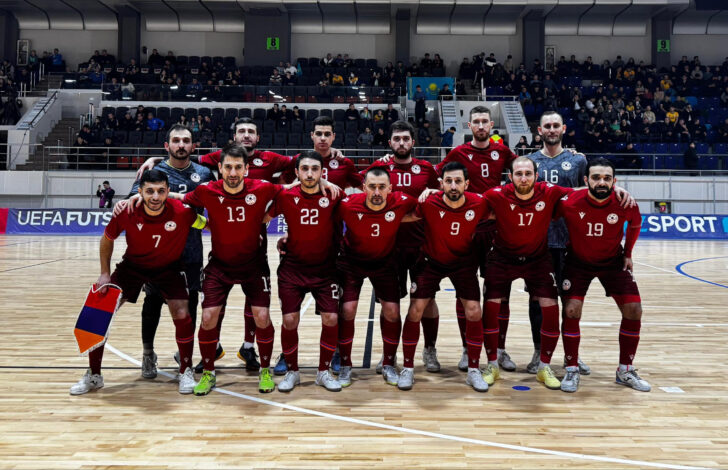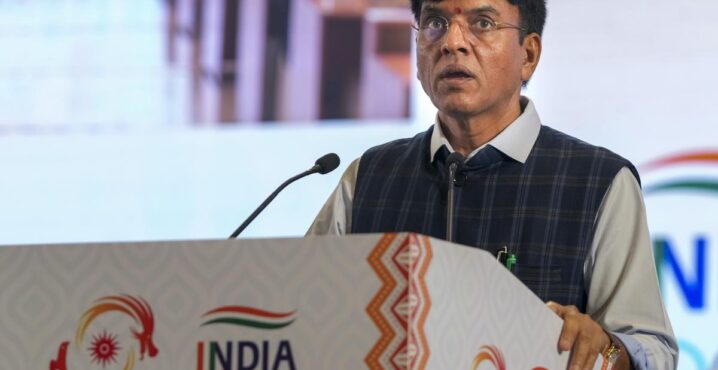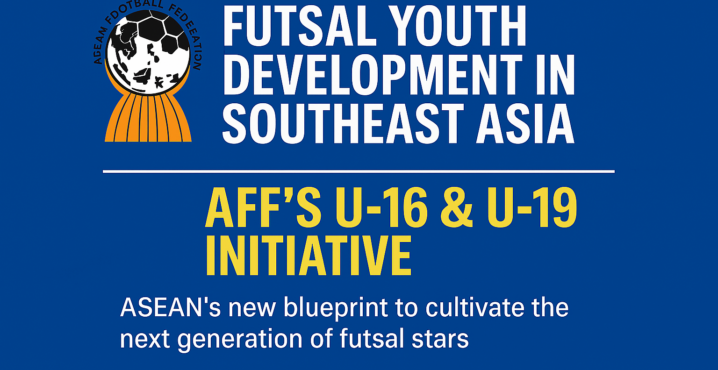Estimated reading time:12 minutes, 24 seconds
Underdogs rise, giants stumble, and new nations make history in a qualifying campaign that reshaped the European futsal landscape.
The road to UEFA Futsal EURO 2026 was as dramatic as it was unpredictable. Between December 11, 2024 and April 16, 2025, forty European futsal teams battled home-and-away in the qualifying Main Round for a coveted spot at the expanded 16-team final tournament. When the dust settled, ten group winners advanced directly to join hosts Latvia and Lithuania, while eight runners-up earned a lifeline via September play-offs. But the simple list of qualifiers hides a saga of narrow escapes, rising underdogs, and historic firsts that made this qualifying cycle one for the ages.
(Main picture: Armenia National Futsal Team before their historic victory over Kazakhstan – source of the image: Football Federation of Armenia)
High Stakes and Narrow Escapes
As the final matchdays approached, several traditional powers found themselves in peril. France, aiming for a return to the EURO after missing 2022, faced a nerve-wracking trip to Tbilisi. Les Bleus needed to avoid losing by four goals to top Group 10, but hosts Georgia surged to a 2–0 lead – one goal away from upending the group. In a display of resilience, France rallied to draw 3–3, clinching first place and the last automatic berth on the very last night. Meanwhile in Zenica, Spain – seven-time European champions – were pushed to the limit by a plucky Bosnia and Herzegovina side. Spain scraped a 3–2 win to preserve their proud record of qualifying for every EURO edition, surviving what Spanish media dubbed a “narrow escape” in Group 8.
Other group finales delivered similar theatrics. In Group 2, Italy and Belarus met in a winner-takes-all showdown on neutral ground in Malta. The Azzurri, two-time champions, were stunned 2–1 by a “tostissima” (very tough) Belarus side, which celebrated a first EURO finals qualification since 2010. Italy’s shock defeat meant Belarus won the group, while Italy – a futsal superpower – was left clinging to a play-off spot. Italian coach Salvo Samperi admitted it was a “dolorosa sconfitta” (painful loss) and urged his team to regroup quickly. Italy did rebound days later with a 4–3 comeback win over Finland to secure enough points for the play-offs, but their direct qualification streak was broken – a stark reminder of how the gap is closing.
No story of near-misses is complete without heartbreak, and two teams in particular endured it. Greece, chasing a maiden EURO berth, entered the final day of Group 5 with faint hopes of overhauling Croatia. Those hopes were dashed twice over: first by Croatia’s emphatic 6–0 defeat of the Greeks (securing Croatia’s passage), and then by Greece’s own slip against Sweden. A surprise loss in Stockholm left Greece second in the group but short of the points needed to be among the “best runners-up,” eliminating them from contention. Likewise, the Netherlands – hosts and quarter-finalists of EURO 2022 – finished runners-up in Group 7 behind holders Portugal but found themselves agonizingly outside the top-eight second-placed ranking. Despite a respectable campaign (two wins and two draws in six matches), the Dutch were one of two runners-up to miss the play-offs by a single point. For the Oranje, who had automatically qualified last time as hosts, failing to even reach a play-off was a sobering fall from grace.
Such was the fine line between ecstasy and agony across the groups. Belgium clinched the very last play-off slot on head-to-head tiebreak, holding off Serbia in Group 9. Had a couple of results gone differently – a goal here or there – Serbia or even Bosnia (in Group 8) might have edged into an automatic berth. Romania, another former EURO semi-finalist, saw its direct hopes vanish in Group 1 after an upset loss to Germany. The Romanians ultimately managed to sneak into the play-offs, but only because Germany’s win also helped group leaders Ukraine clinch first place early. Such fine margins underscored the heightened parity in European futsal: traditional powers were made to sweat, and newcomers showed no fear.
New Faces and Notable Improvements
Beyond the familiar names, the Main Round spotlighted a wave of rising nations who have markedly improved since the last EURO cycle. The most remarkable story was written by Armenia, a country with little futsal pedigree until now. Drawn into Group 6 alongside 2016 bronze-medalists Kazakhstan, Armenia were expected to battle for second place at best. Instead, they shocked the continent by winning the group unbeaten (5 wins, 1 draw) and sealing their first-ever EURO finals berth. In front of jubilant home fans in Yerevan, Armenia defeated Kazakhstan 4–2 in the decisive match to complete the “historic breakthrough.” The achievement is even more impressive considering Armenia did it without several naturalized Brazilian veterans, who were sidelined by new eligibility rules. Head coach Ruben Nazaretyan hailed the qualification as the culmination of six years of development work, emphasizing that his team isn’t content just to make up the numbers. “We are not going to EURO 2026 just for the sake of participation. We are not going there to be easy prey for other teams,” Nazaretyan declared, adding “today, we defeated the second-best team in Europe – that says a lot. We are ready for more, and we will prove it at the European Championship!” Indeed, by toppling mighty Kazakhstan (semifinalists in 2022), Armenia signaled that a new contender has arrived.
Another headline-grabber was Belarus, a nation absent from the EURO finals since 2010. Considered outsiders in a Group 2 featuring Italy, the Belarusians delivered one of their finest campaigns to date. They went toe-to-toe with Italy across six matches – including a dramatic 2–2 draw in November where Italy needed a last-minute goal to save face – and ultimately leapfrogged the Azzurri with that decisive 2–1 victory in April. For a team that had never beaten Italy in official competition, winning the group marked a watershed moment. Belarus coach Aleksandr Chernik masterminded a defensively solid, counter-attacking side that conceded only 9 goals in 6 games. The reward: Belarus returns to the European stage after 16 years, proving that sustained investment in futsal at home can pay dividends.
Several other nations showed clear improvement compared to recent competitions. France’s group-topping performance (edging out a strong Georgian side) affirmed that their run to the 2024 Futsal World Cup semifinals was no fluke. Les Bleus had failed to qualify for EURO 2022, but this time they navigated a tricky Group 10 with poise – including a 5-0 rout of Kosovo – to reach their first EURO finals since 2018. Poland continued its resurgence as well: the Poles won Group 3 ahead of 2022 quarter-finalists Slovakia, securing a third straight EURO qualification. In Group 4, Slovenia – a sleeping giant which struggled in 2022 qualifying – rediscovered top form and clinched first place without defeat, returning to the finals for a seventh consecutive time. Even futsal’s smaller lights had moments of growth: Norway earned its first-ever win in a EURO main round by upsetting Montenegro away, England celebrated a victory in its first home match at this level (4–2 vs Switzerland), and Moldova grabbed a statement 5–3 win over Slovakia that kept their slim play-off hopes alive until the final day. Across the continent, record-breaking crowds reflected this rising enthusiasm: from Denmark drawing 3,570 fans (triple their previous best) against Albania, to Germany packing nearly 3,500 for a home tie with Ukraine. Futsal’s footprint is clearly expanding, and so is the competitiveness of its player base.
Shifts in the Global Hierarchy
The dramatic results of the main round have already reverberated beyond Europe, triggering significant movements in the FIFA Futsal World Ranking. The most eye-catching leap has been by – no surprise – Armenia. On the back of their undefeated qualifying run, Armenia climbed an “almighty leap” of 11 places to break into the world’s top 20 for the first time. Poland, too, saw their consistency rewarded with a rise into the global top 20, underlining that Poland is increasingly a force to be reckoned with on the international stage.
Meanwhile, Belarus’ triumph over Italy catapulted them to their highest ranking in history. Once outside the top 20, Belarus jumped up to 16th in the world rankings – a remarkable achievement for a nation that has often been in the shadow of Europe’s giants. Latvia, as hosts, also soared 27 places in the rankings thanks to their strong performances during the campaign.
On the flip side, a few traditional contenders paid the price for their qualifying stumbles. Finland, which had been the Cinderella story of EURO 2022 (reaching the quarter-finals in their debut), plummeted in the rankings after failing to get out of their group – dropping from 15th to 24th. Similarly, Serbia – a 2016 EURO semifinalist – saw its global standing drop as it missed the finals for the second straight cycle, sliding out of the top 15 to 19th. The up-and-down movements of these rankings tell a clear story: the middle tier of European futsal is more fluid than ever. Countries like Kazakhstan and Italy, long entrenched in the world top 10, can no longer take their status for granted if they falter in key games, while ambitious upstarts are rapidly closing the gap. Even Spain, by virtue of navigating a tricky group and recent good form, inched up within the world’s top three again – reinforcing that nothing stands still in futsal’s global hierarchy.
Standout Performances and Surprises
Amid the tense qualification battles, there were individual and team performances that lit up the Main Round. Ukraine, a perennial power, showcased offensive firepower that was second to none – most spectacularly in an 11–1 demolition of Cyprus. That win, one of the largest margins of the round, featured a goal glut from rising star Yevhenii Zhuk, who would finish as the top scorer of the entire qualifying competition with 9 goals. Ukraine’s dominance in Group 1 (six wins in six) secured their 11th consecutive EURO qualification, underscoring the squad’s consistency even amid generational change.
In Group 5, Croatia’s talismanic skipper Tihomir Novak turned back the clock with a series of clutch performances, including a hat-trick against Azerbaijan and a masterclass in the decisive win over Greece. His leadership helped Croatia maintain their streak of six straight EUROs and fend off all challengers.
Yet it was often the underdogs who delivered the most memorable moments. The biggest upset of the campaign came courtesy of Denmark. On February 1, 2025, in front of a raucous crowd in Brøndby, the unheralded Danes stunned Kazakhstan – one of the world’s top teams – with a 3–2 victory that left the futsal community in disbelief. Denmark’s coach Nikolaj Saabye was exuberant in his post-match comments: “We deserved this win! The guys fought so hard. We just beat one of the best teams in the world — this is absolute madness!”
Indeed, for a Danish side that had never come close to EURO qualification before, taking down a global powerhouse was a victory to savor, even though they ultimately finished third in Group 6. Not to be outdone, Moldova provided its own heroics by toppling Slovakia 5–3, fueled by a hat-trick from captain Alexandr Obade. That result not only kept Moldova’s slim hopes alive but also indirectly helped Poland clinch Group 3.
In Group 8, England’s novice squad earned plaudits despite finishing last – their historic 4–2 win over Switzerland in Nottingham was a milestone, and 20-year-old Dylan Malone’s four-goal haul across the group games showed that even newcomers can produce star turns.
Defensively, a special mention goes to Portugal. The reigning European champions were a model of efficiency in Group 7. They became the first team to secure qualification, wrapping up top spot in February with two games to spare. Led by coach Jorge Braz, Portugal conceded only 5 goals in 6 matches and introduced some fresh faces along the way. While their qualification was expected, their professionalism ensured there were no slip-ups – even against a motivated Dutch side that held them to a draw in one encounter.
On the flip side, Bosnia and Herzegovina (though eventually a play-off team) turned heads with attacking flair: they racked up 32 goals in Group 8, the highest of any runner-up, including a 9-0 thrashing of Switzerland. The Bosnians’ ability to push Spain to the brink in their head-to-head meetings (2-3 and 1-6) suggests they could be a dangerous floater if they reach the finals.
The Main Round also had its share of bittersweet stories. Azerbaijan, a quarter-finalist in 2016 and 2022, endured a surprisingly poor campaign in Group 5, finishing behind even Sweden. It marked a steep decline for a team once known for its Brazilian-born stars and regular EURO appearances. Similarly, Hungary showed promise by beating Slovenia once and finishing second in Group 4, but a costly home loss to Norway robbed them of an automatic berth, consigning them to yet another play-off (Hungary’s fourth in the last five editions). These narratives highlight that while some teams rose, others fell back – the carousel of European futsal continues to spin.
A Qualifying Campaign to Remember
When the UEFA Futsal EURO 2026 kicks off in January 2026 in Riga and Kaunas, it will do so with a lineup of finalists that blends established titans and hungry newcomers. The qualifying main round delivered all the ingredients of a classic sports saga: underdogs toppling giants, giants under pressure, record-breaking feats, and poignant near-misses. It gave us heroes like Ruben Nazaretyan and his Armenian squad making history, and heartache for the likes of Greece who must wait at least another four years for their dream. It also reinforced that futsal in Europe is on an upward trajectory – competitively and in popularity – with more countries than ever capable of playing at a high level.
As Armenia’s coach put it, his team has proven they won’t be “easy prey” among the continent’s elite. And as Denmark’s coach exulted after their big upset, sometimes this sport is “absolute madness” – in the best possible way. The main round of EURO 2026 qualifying was full of such madness and magic. Now, with the finals on the horizon, fans can look forward to seeing whether these storylines continue: Will the newcomers shock the world again? Can the old guard reassert their dominance? The stage is set for a futsal festival in Latvia and Lithuania, thanks to a qualifying campaign that has already made history and set the tone for an enthralling UEFA Futsal EURO 2026.
Organ Donation
Futsal Focus is a supporter of Dáithí Mac Gabhann and his family’s campaign to raise awareness of Organ Donation. We encourage our readers to learn more about Organ Donation: https://www.organdonation.nhs.uk/
Futsal Focus
You can read more articles about International Futsal by going to the top navigation bar or by clicking here
If you like this article and would like to keep updated on Futsal news, developments, etc. You can now follow Futsal Focus via Google News. By following our page which will send you an alert as soon as we publish an article. Please click here and follow us on Google.
You can also keep updated on Futsal news, developments by submitting your email below in the Subscribe to Futsal Focus option.
Follow Futsal Focus by clicking on Facebook, Twitter, or Instagram or on the social media buttons on the website
















![Validate my RSS feed [Valid RSS]](https://www.futsalfocus.net/wp-content/uploads/2020/01/valid-rss-rogers.png)




